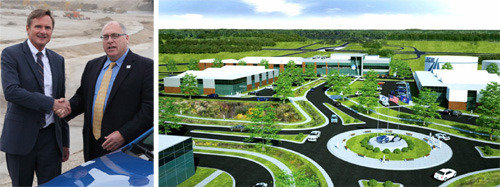Hyundai Motor joins auto-driving research project in U.S.
Hyundai Motor joins auto-driving research project in U.S.
Posted October. 26, 2017 07:37,
Updated October. 26, 2017 08:11

Hyundai Motor Group has secured partnerships with Ford, Toyota and AT&T to build a large-scale research complex for the testing of fully automated driving technologies in Michigan, the United States. The Korean automaker aims to push forward with its efforts to increase a technology-based partnership with global peers, for which Hyundai’s passive approach has been criticized, and develop technologies for automated vehicles.
Hyundai Motor Group will build the American Center for Mobility (ACM) in Michigan, a hub of the U.S. auto industry, according to the company on Wednesday. The Michigan state government, the University of Michigan, Ford, Toyota and AT&T also join the ACM project along with Hyundai. The main initiative of the ACM project is to build a large-scale research complex, where engineers can test technologies for fully automated car. Hyundai and other partners plan to invest 5 million U.S. dollars each for construction of the research complex.
The research complex will sit on a 2-million-square-meter site, 15 times bigger in size than the 130,000-square-meter M-City, an existing test facility for automated cars built in Michigan in July 2015. Accordingly, the new test facility is expected to demonstrate various scenarios. The ACM research complex will present different road simulations including expressway, city road, country road, unpaved road and residential area road. Cutting-edge information and communication technology infrastructure will also be installed such as a 5G short-distance wireless network system to enable engineers to test the Vehicle-To-Everything system through which a driver can send and receive information with other drivers or traffic infrastructure such as traffic lights. The first phase of facility construction of the ACM is scheduled to be completed in December this year, and the final completion is due in 2019.
Through partnership for the ACM, Hyundai Motor Group aims to test technologies owned by Hyundai Motor, Kia Motors and Hyundai Mobis, and also expand the exchange of technology with global peers such as Ford and Toyota. Another huge benefit from this partnership is that Hyundai will also participate in tasks to help build U.S. standards for automated driving technologies, which have been executed by the state. Michigan, where major U.S. automakers relocated, has been committed to leading the U.S. automated driving system. Michigan State has become the first U.S. state government to legislate a bill on automated cars that allows sale and operation of automated cars not only to complete car manufacturers, but also to ICT companies including Google and Uber.
Hyundai Motor Group has been criticized for its passive approach toward partnership with global companies while valuing traditional practices at home. As automated car is incorporation and integration of multiple industries, Hyundai has been advised to evolve from the traditional way of thinking.
“It is welcoming that Hyundai Motor Group has decided to expand the exchange of technology with global companies,” said Kim Pil-soo, an automotive engineering professor at Daelim University. “The Korean government should also support practical tests for cutting-edge vehicles by Hyundai and other local companies.”
Woo-Shin Han hanwshin@donga.com







